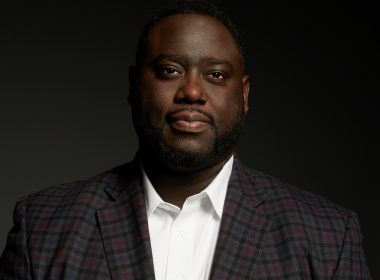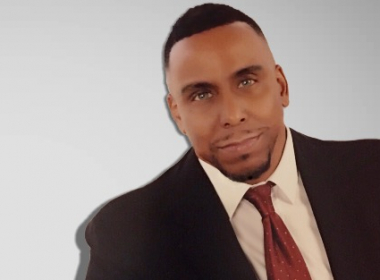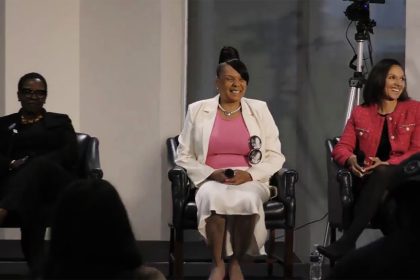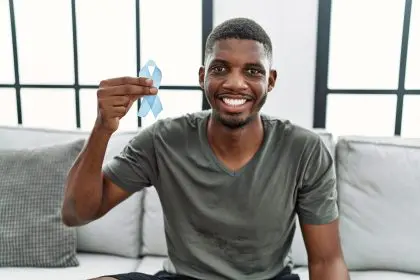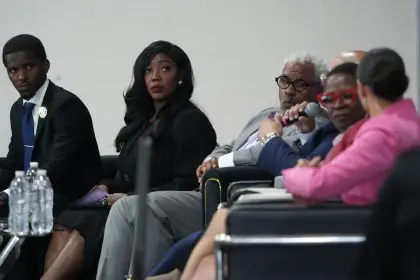
Shortly before his award recognition, rolling out spoke with “theGrio” CEO Todd Brown. In this interview, we discussed his personal brand, the power and future of Black media, and how Africans in America can stand to make a difference with our impact.
How important is activism?
When you use the word “activism,” I’m often confused relative to its importance. I think activism with a purpose, focus and an outcome that can be measured by the people being active is very important. When I think of the term “activism” in the context of media and what’s going on in the United States, I think of “Black Lives Matter,” “Black Girls Rock” and “Black Girl Magic,” but I never hear the “power” which is “Black Media Matters,” “Black Buying Power Matters” and Black impact on the political environment [on the] local, state, national, regional, and federal [level] matters. Black engagement around the legal processes of voter registration matters, being in good standing so you can serve on court juries matters. I think the word “activism” is often clouded in loud. It should be clouded in purpose, focus and result. It’s important if it’s used right, otherwise it’s just “loud.”
What are three important issues facing the African American community?
Education, jobs and political savviness. The definition of politics is the division of power, how power will be managed, and by whom. I think that our power base is not savvy. It’s actually pretty pedestrian if not sheep-like. We just do the predictable. There is no price in the Black community for failing us. I really admire the LGBTQ community. They have adopted the mechanism for the importance of respect for their community in a way that forces the agenda. They exact a price when you don’t treat them right. They identify champion, and they exert their power politically, media-wise, socially, financially. I think we not very savvy in that we invented it, yet we can’t come together in any kind of concerted focus and wield any of that power. That is lack of education and why we don’t have access to opportunity whether it be jobs and/or creating businesses.
What does “Vote It Loud” mean to you?
I said this when they contacted me; I think it’s actually sad that the organization itself is a separate but unequal opportunity to celebrate Black media, Black impact, and Black correspondents because generally unless we’re celebrities we are not invited to the correspondents dinner at the White House with arguably the first and last Black president. During the whole eight-year tenure there hasn’t been an embrace of Black media, or an invite or inclusion in it. We have to start recognizing ourselves. I think it’s a great empowerment move. Unfortunately, it happens to be outside of the mainstream like much of the activism and media we do, but it is a celebration of impactful people in a powerful way and I think that’s a start. Waiting for other people to invite or include us, even if they look like us, may be a long way ahead.
How does the “Vote It Loud” honor respect your personal brand?
My personal brand has never been my focus. The impact of black media both from the time I spent with Johnson publishing company to trying to create a business model that supports “The Grio” is important to me personally. The reason why it’s important to me personally is because I know that those focused on the space of black media, generally do not get a portion of the monetization of this audience. Advertisers do not connect with our audience in a demonstrative way in order to make these businesses more sustainable. I think the honor for me is to be “out loud” a bit about the fact that black media should matter. Personally me representing the brand, is to try to bring credibility whereas when I was in mainstream; white-published media’s business was much better because they were highly-capitalized, had access to power, and had a mechanism where the economic system supported their media and weren’t a bunch of scrambling people working basically for free or in a break-even basis. The honor is to begin a conversation about why black media matters, less to do with Todd Brown and more to do with the survivability of brands that are hyper-focused on this space that have legitimate black equity in the ownership group.
What do you believe advertising agencies could do better for African Americans?
Well, they’re not doing anything right now for African Americans except a couple of set-asides and African American agencies that are trying to help define who we are and how we should be spoken to. Very little money is trickling down on a percentage basis to any of the black media outlets. All of them have a piece of the puzzle. The print audience may be Essence and Ebony. The media audience that is owned by mainstream folks at BET, VH1, Bravo, Lifetime, and other networks that are focused on our audience don’t necessarily engage in the opportunity because the agencies believe that the new market is total and you don’t have to spend any time on the black media owners. Frankly, that goes back to my other point, we haven’t exacted a tone and made a demand on power. That’s when this platform begins to have a conversation in that direction where you’re recognizing civil servants, congressmen, media pundits, and also including some black equity in that conversation around media ownership and us actually having an independent voice about what’s going on in our community. None of that happens if it’s not supported by a real business model.
I often say we lack on the revenue side of the equation and we also lack materially on the capital side. I’ve met a Black Mark Zuckerberg, I’ve met a Black Arianna Huffington, I’ve met a Black creator of a communication mechanism like Twitter. However, I’ve never seen any of them get funded at any portion of the kind of money that’s being given for experimentation in support of other ideas. Therefore, you’re not making the money on the right side of the balance sheet, you’re not making it on the left side of the balance sheet, so you’re just struggling, hustling and trying to survive. That doesn’t give you the amount of opportunities to support writers, storytellers and how things happen. The ad agency question is loaded because they’ll only do what the audience allows them to do. If they we’re doing this to “White-women” owned media then there would be a really loud outcry from the total media and it would affect their buying habits as opposed to outliers where you get Al Sharpton or Jesse Jackson crying that it’s broken. The community doesn’t come together and say “we demand a higher ROI for our readership, our viewership, and our connection.”
Name three reasons to be socially engaged for change?
Your family, your future, and your economics are all connected, especially if you are a disenfranchised person. If you are in one of these disenfranchised groups economically, physically, socially, then you better try to figure out how to marshall your voice and exert some leverage of power or you’ll be marginalized which I think is happening to the African in America. We are the most disenfranchised people. We do the things required of us but we don’t have the kind of representation at the levels that we should have it. That’s largely because we don’t come together, stand up collectively and make demands on ourselves and the systems that we participate in with our dollars and energy.
Lastly, how do you use technology to share politically and socially?
Well, I think it has everything to do with social media right now. The things that we cover, whether we cover it from the perspective of the “African in America.” Meaning black people putting light on issues that aren’t being covered in the main and continuing the long-term conversation on Facebook, Twitter and driving content to social platforms and also having it on our website where we are connected in a mobile way, keeping the conversation going way beyond whatever quarter the news is coming from. The activism right now is defining the conversation, and then the echo of the conversation to keep it going long enough to turn into a potential impact on policy, on votes, and on the community.


